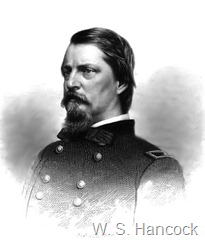August 21.—Jeff Davis issued an order from Richmond, directing that Major-Gen. Hunter and Brig.-Gen. Phelps should no longer be held and treated as public enemies of the rebel States, but as outlaws; and that in the event of the capture of either of them, or that of any other commissioned officer of the United States employed in drilling, organizing, or instructing slaves, with a view to their armed service in the war, he should not be regarded as a prisoner of war, but held in close confinement for execution as a felon, at such time and place as Jeff Davis might order. —To-day the Union army, under Gen. Pope, and the rebel army, under Gen. Lee, faced each other on the Rappahannock, the former on the north and the latter on the left bank of the river. An attempt was made on the part of the rebels to cross the river at Kelly’s Ford, for the purpose of turning the position of the Unionists, but it was foiled by General Reno, who opened fire with his batteries, and then followed it with a cavalry charge, which put them to flight, and determined them to make no more attempts to cross at Kelly’s Ford.—(Doc. 104.)
—A war meeting was held at Southficld, Staten Island, N. Y. —Thomas Shultzer, one of the editors of the Maryland News Sheet, was released from Fort McHenry, on taking an oath not to engage in newspaper business, nor do any thing to aid and abet rebellion during the continuance of the war. Carpenter and Neilson, the responsible editors and publishers of the same paper, refused to take the oath.
—The rebel schooner Eliza, loaded with salt and other contraband goods, was captured off Charleston, S. C, by the United States steamer Bienville.
—The Union pickets on Pinckney Island, near Hilton Head, S. C, were attacked by a superior force of rebel troops, and thirty-two of their number taken prisoners, three killed and three wounded.—A very large and enthusiastic war meeting was held at St. Louis, Mo., in the Mercantile Library Hall, at which Gov. Gamble made the principal speech. He recommended a most vigorous war policy in the State, and deprecated the disposition to find fault with the policy of the Federal Government. He recommended the extermination of the guerrillas in the State, and would make the secessionists pay for the protection they received from the Government. He would drive South all non-combatants who denounced the Government. The military authorities held bonds from the rebels to the amount of over a million of dollars, and he advised all broken bonds to be collected at once. The speech was received with tremendous applause.
—A severe fight took place at Gallatin, Tenn., between a body of Union troops under the command of General R. W. Johnson, and an inferior force of rebel cavalry, under Col. John H. Morgan, resulting in a rout of the Unionists with great loss.—(Doc. 187.)
Winfield Scott Hancock (February 14, 1824 – February 9, 1886) was a career U.S. Army officer and the Democratic nominee for President of the United States in 1880. He served with distinction in the Army for four decades, including service in the Mexican-American War and as a Union general in the American Civil War.



